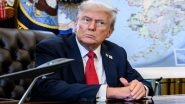Hong Kong, Mar 4 (AFP) Asian equities fluctuated Wednesday following another sell-off on Wall Street after the Federal Reserve's steep interest rate cut exacerbated concerns about the impact of the new coronavirus on the US and global economy.
The surprise move came as central banks around the world pledge to do what they can to mitigate the fallout from the disease, which continues to spread to new countries and is crippling economic activity.
In announcing the reduction, the bank said US fundamentals "remain strong" but warned that the "coronavirus poses evolving risks to economic activity", the Federal Open Market Committee said in a statement.
The move, which came two weeks before the Fed's next planned policy meeting, initially sent Wall Street rallying but traders soon reversed course as they grew increasingly nervous about the economic outlook.
It also followed a much-anticipated but eventually underwhelming conference call between G7 finance ministers, which said only that they would use "all appropriate policy tools" to keep the virus epidemic from throttling growth.
"Cutting at this time is a questionable use of limited ammunition," said AxiCorp's Stephen Innes.
"Without G7 fiscal cannons firing, a rate cut alone is not going to solve supply chain issues or get people back on planes.
"The psychological benefits and positive asset price impacts of rate cuts right now may also be fleeting, especially as the market gets swamped yet again by more negative real-life headlines about new cases."
And Kerry Craig at JP Morgan Asset Management said: "The Federal Reserve's attempt to surprise the market may have misfired.
"While the action was intended to steady market confidence, the sharpness of their reaction and the off-schedule timing of the move could be interpreted as the Fed being much more concerned about the economic impact than first thought."
All three main indexes on Wall Street ended almost three per cent down.
However, Asian investors battled to build on the previous day's gains and were mixed in early trade.
Tokyo ended the morning 0.4 per cent higher, while Shanghai added 0.1 per cent, though Hong Kong was down 0.4 per cent.
Seoul was the standout, surging more than two per cent as South Korea -- which is the worst hit country outside China -- reported a sharp drop in new cases of the virus.
Wellington and Taipei also rose with Jakarta. But Sydney fell 1.5 per cent, Singapore lost 0.2 per cent and Manila dropped one per cent.
Observers also pointed out that the effect of central bank action was limited and the world leaders needed to work together to battle the outbreak, which has killed more than 3,000 people and infected around 92,000.
"As the spread of the coronavirus continues and the chances of containment become slimmer, the impact on the global economy is likely to be sizeable," said Anna Stupnytska, of Fidelity International.
"While easier monetary policy helps sentiment, central banks should not be acting in isolation -- the governments should step in with fiscal measures that are timely and well designed, supporting the economies that struggle not just from the virus itself but also from preventative measures that -- in some cases -- have ground activity to a halt."
The rate cut sent yields on safe-haven 10-year US Treasuries, a go-to asset in times of turmoil, below one percent for the first time on record.
Gold, another fallback for worried investors, jumped almost three per cent to USD 1,645.
And the dollar, which tanked Tuesday, continued to suffer selling in Asia, with higher-yielding, riskier units benefitting. The South Korean won was among the big gainers, adding 0.8 per cent with hopes for government or central bank support also boosting that currency.
Indonesia's rupiah, the Australian dollar and Chinese yuan all rallied.
Oil prices added more than one per cent after OPEC advisers suggested the group, along with other producers including Russia, slash output by up to a million barrels a day.
The recommendation comes as the oil big-hitters prepare to meet this week to discuss the crisis, which has hammered global demand for the commodity. (AFP)
(The above story is verified and authored by Press Trust of India (PTI) staff. PTI, India’s premier news agency, employs more than 400 journalists and 500 stringers to cover almost every district and small town in India.. The views appearing in the above post do not reflect the opinions of LatestLY)













 Quickly
Quickly


